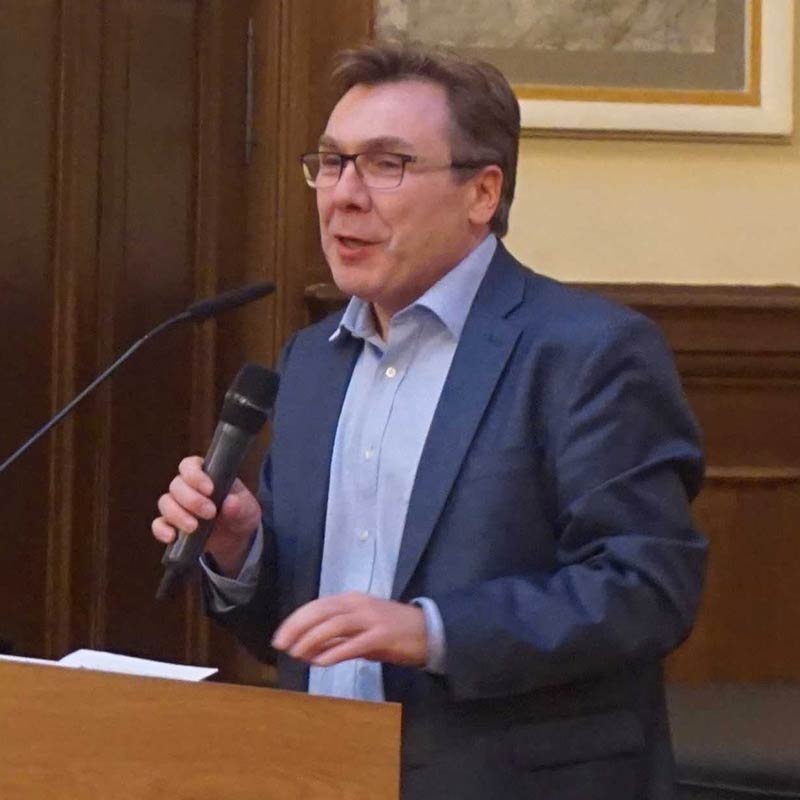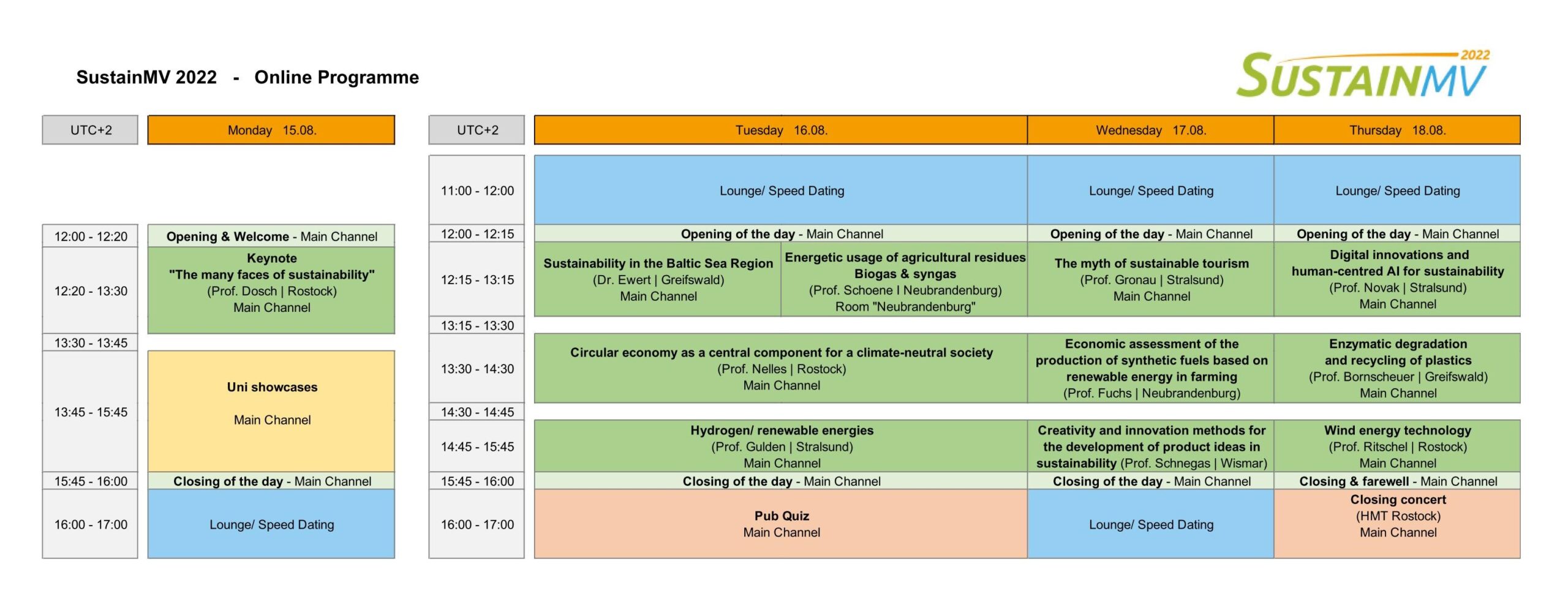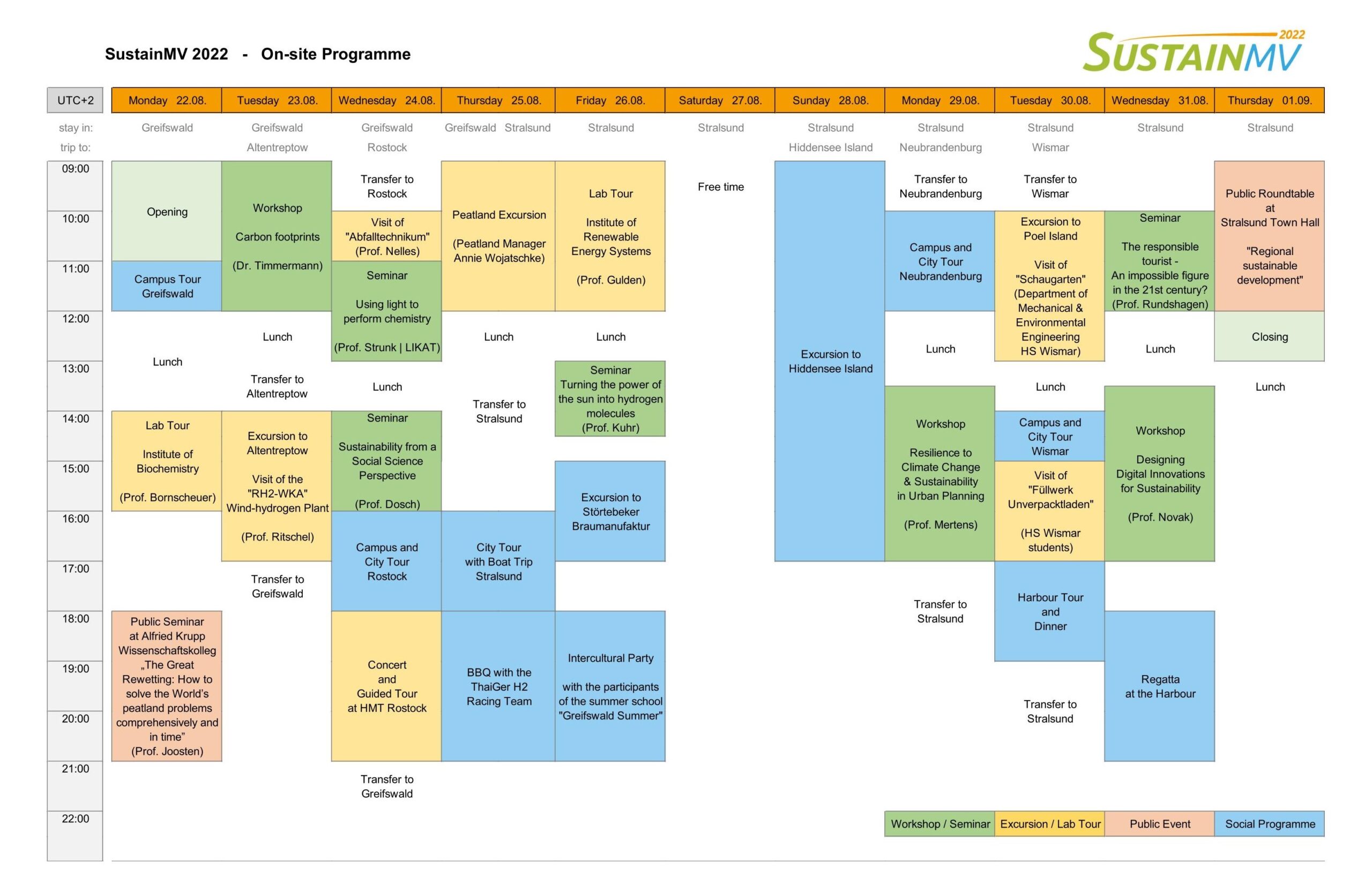Programme 2022
The Sustainability Summer School
SustainMV started 2021 as an online format due to the pandemic. In 2022 the on-site programme was added. International students from all parts of the world came to Mecklenburg-Vorpommern to discuss sustainability in different contexts and, along the way, to get to know the various higher education institutions and research facilities in the MV science region. The agenda included workshops and seminars, excursions and laboratory tours as well as a varied leisure programme.
I am text block. Click edit button to change this text. Lorem ipsum dolor sit amet, consectetur adipiscing elit. Ut elit tellus, luctus nec ullamcorper mattis, pulvinar dapibus leo.
I am text block. Click edit button to change this text. Lorem ipsum dolor sit amet, consectetur adipiscing elit. Ut elit tellus, luctus nec ullamcorper mattis, pulvinar dapibus leo.
I am text block. Click edit button to change this text. Lorem ipsum dolor sit amet, consectetur adipiscing elit. Ut elit tellus, luctus nec ullamcorper mattis, pulvinar dapibus leo.
12:30 – 13:30
I am text block. Click edit button to change this text. Lorem ipsum dolor sit amet, consectetur adipiscing elit. Ut elit tellus, luctus nec ullamcorper mattis, pulvinar dapibus leo.

Sample Heading
Lorem ipsum dolor sit amet, consectetur adipiscing elit. Ut elit tellus, luctus nec ullamcorper mattis, pulvinar dapibus leo.
12:30 – 13:30
I am text block. Click edit button to change this text. Lorem ipsum dolor sit amet, consectetur adipiscing elit. Ut elit tellus, luctus nec ullamcorper mattis, pulvinar dapibus leo.

Sample Heading
Lorem ipsum dolor sit amet, consectetur adipiscing elit. Ut elit tellus, luctus nec ullamcorper mattis, pulvinar dapibus leo.
I am text block. Click edit button to change this text. Lorem ipsum dolor sit amet, consectetur adipiscing elit. Ut elit tellus, luctus nec ullamcorper mattis, pulvinar dapibus leo.
I am text block. Click edit button to change this text. Lorem ipsum dolor sit amet, consectetur adipiscing elit. Ut elit tellus, luctus nec ullamcorper mattis, pulvinar dapibus leo.
I am text block. Click edit button to change this text. Lorem ipsum dolor sit amet, consectetur adipiscing elit. Ut elit tellus, luctus nec ullamcorper mattis, pulvinar dapibus leo.
Keynote: Sustainability – from a fuzzy concept to a guiding principle
12:30 - 13:30
A recent online article is aptly titled: “Sustainability – confusing term for a clever concept“. This nicely summaries both the beauty and challenge in dealing with this important concept. The idea of sustainability first emerged with regards to forestry, where it means never harvesting more than what the forest yields in new growth. The word “Nachhaltigkeit” (the German term for sustainability) was first used with this meaning in 1713. Since then the concept of sustainability has come a long way. In general terms, sustainability means meeting our own needs without compromising the ability of future generations to meet their own needs. However, this is not restricted to the natural environment but also extends to social and economic resources. Thus, sustainability goes beyond environmentalism and also encompasses social equity and economic development. Sustainability can also be understood as a movement which has its roots in social justice, conservationism or internationalism. By the end of the 20th century, many of these ideas were united under the roof of “sustainable development” and found their most prominent expression in the Sustainable Development Goals (SGD) as the current global agenda for reducing poverty and raising the quality of life. Sustainability as a political and strategic concept has its origin in the Brundtland Report “Our Common Future” of 1987. The report was concerned with the tension between the aspirations of mankind towards a better life on the one hand and the limitations imposed by nature on the other hand.
The presentation traces the history of the concept of sustainability and critically discusses its many dimensions.
Lorem ipsum dolor sit amet, consectetur adipiscing elit. Nulla eros urna, aliquet et porttitor in, congue ut risus. Nunc placerat faucibus ligula a mattis.
Lorem ipsum dolor sit amet, consectetur adipiscing elit. Nulla eros urna, aliquet et porttitor in, congue ut risus. Nunc placerat faucibus ligula a mattis.
Lorem ipsum dolor sit amet, consectetur adipiscing elit. Nulla eros urna, aliquet et porttitor in, congue ut risus. Nunc placerat faucibus ligula a mattis.
12:30 – 13:30
Keynote: Sustainability – from a fuzzy concept to a guiding principle
A recent online article is aptly titled: “Sustainability – confusing term for a clever concept“. This nicely summaries both the beauty and challenge in dealing with this important concept. The idea of sustainability first emerged with regards to forestry, where it means never harvesting more than what the forest yields in new growth. The word “Nachhaltigkeit” (the German term for sustainability) was first used with this meaning in 1713. Since then the concept of sustainability has come a long way. In general terms, sustainability means meeting our own needs without compromising the ability of future generations to meet their own needs. However, this is not restricted to the natural environment but also extends to social and economic resources. Thus, sustainability goes beyond environmentalism and also encompasses social equity and economic development. Sustainability can also be understood as a movement which has its roots in social justice, conservationism or internationalism. By the end of the 20th century, many of these ideas were united under the roof of “sustainable development” and found their most prominent expression in the Sustainable Development Goals (SGD) as the current global agenda for reducing poverty and raising the quality of life. Sustainability as a political and strategic concept has its origin in the Brundtland Report “Our Common Future” of 1987. The report was concerned with the tension between the aspirations of mankind towards a better life on the one hand and the limitations imposed by nature on the other hand.
The presentation traces the history of the concept of sustainability and critically discusses its many dimensions.
Speaker
Prof. Dr. Jörn Dosch
Jörn Dosch is Professor/Chair of International Politics and Development Cooperation and Vice-Dean of the Faculty of Economics and Social Sciences, University of Rostock, Germany.
He is also Adjunct Professor at the University of Malaya in Kuala Lumpur, one of the leasing universities in Asia. Previous positions include Professor of International Relations at the Australian Monash University (Malaysia Campus), Head of the Department of East Asian Studies, University of Leeds, and Fulbright scholar at Stanford University. He received his PhD from the Johannes Gutenberg-University Mainz. His research and teaching focuses on politics, international relations and questions of development in Europe, Asia and Latin America. He has spent extended periods of time in Asia since the early 1990s. Prof. Dosch also regularly works as a consultant for the European Union’s development program and has evaluated several donor-funded projects in Asia and Latin America.

